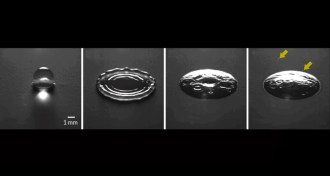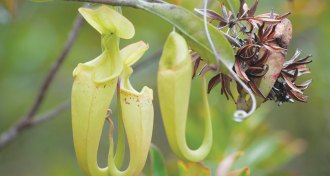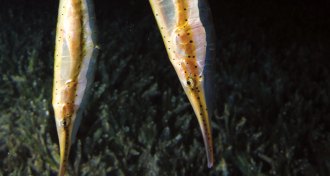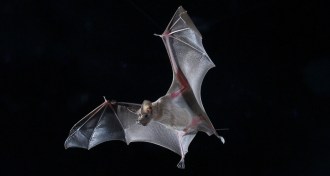Notebook
-
 Physics
PhysicsRaindrops kick up soil chemicals
The champagne-like fizz produced when a raindrop hits the ground may be responsible for the earthy aroma after a rainstorm.
By Andrew Grant -
 Health & Medicine
Health & MedicineFallout from nuclear bomb testing presaged today’s radioactive tracers
Scientists in 1965 measured buildup of radioactive carbon from nuclear bomb testing in people.
-
 Plants
PlantsFairly bad pitcher traps triumph in the end
Carnivorous pitcher plant traps rarely catch much, but their lackadaisical hunting turns out not to be so lame after all.
By Susan Milius -
 Astronomy
AstronomyGiant rings encircle young exoplanet
Stretching 90 million kilometers from their center, 37 stripes of dust around exoplanet were probably crafted by moons.
-
 Neuroscience
NeuroscienceDecoding sommeliers’ brains, one squirt of wine at a time
Researchers use a ‘gustometer’ to control wine portions in experiments comparing the brains of sommeliers and novices.
-
 Planetary Science
Planetary ScienceDecades-old idea brought to fruition: a mission to Mercury
In 1965, engineers proposed sending a spacecraft to Mercury with help from another planet’s gravity – a technique now used in many interplanetary missions.
-

-
 Psychology
PsychologyEmotions go unnamed for some with eating disorders
A portion of women with eating disorders have a separate problem recognizing their own emotions, a condition called alexithymia.
By Bruce Bower -
 Tech
TechUsing Facebook ‘likes,’ computer pegs people’s personalities
Using limited data from Facebook, computers can outdo humans in assessing a user’s openness, neuroticism and other personality traits.
-
 Animals
AnimalsEarth’s magnetic field guides sea turtles home
Over 19 years, geomagnetic fields changed slightly and so did loggerheads’ nesting sites.
By Julia Rosen -
 Humans
HumansBabbling to babies is OK, despite previous warnings against it
Fifty years ago, a researcher advised banning baby talk, but results since then say otherwise.
-
 Animals
Animals‘Bag of chips effect’ helps bats find a meal
Bats get a clue to where dinner is by listening to peers attacking prey.